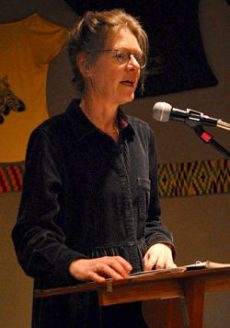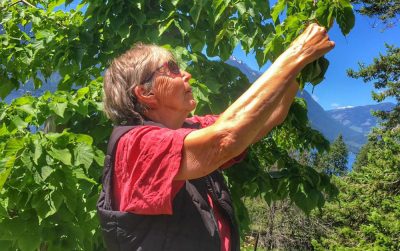#759 Rewilding the human mind
Learning to Die: Wisdom in the Age of Climate Crisis
by Robert Bringhurst and Jan Zwicky
Regina: University of Regina Press, 2018
$19.95 / 9780889775633
Reviewed by Luanne Armstrong
*
 I am always a little leery about academics and philosophers writing about humans grappling with ideas about the non-human world. There’s always a distance there from direct experience which, in my experience from reading their work, can lead them into some cliched alleyways and ideas.
I am always a little leery about academics and philosophers writing about humans grappling with ideas about the non-human world. There’s always a distance there from direct experience which, in my experience from reading their work, can lead them into some cliched alleyways and ideas.

And I also think there is a deep need for scholars in all disciplines to consider questions of the human experience in the light of climate change and resource depletion.
This small but deeply thought-out philosophical book writes toward the question many of us are grappling with and many of us are resisting: in the face of today’s climate challenge, how do we face not only our own deaths, but the possible death of many non-human lives — animals and plants – that humans know little about and have discounted as unimportant for far too long?
The authors of Learning to Die: Wisdom in the Age of Climate Crisis are both poets and philosophers and are, as well, writers who have examined human ideas of the natural world very carefully. The impetus toward this book sprang from a conference held in 2013, in Clearwater, BC, called Speak to the Wild. Part 1 of the book is derived from a speech made by Robert Bringhurst at the conference and Part 2 was written specially for Learning to Die by Jan Zwicky.

The idea of “the wild” is a notion that has changed hugely over time, notably through colonization and contact with Indigenous people who have a very different relationship with “the wild” than settler people. The wild, Learning to Die asserts, “is earth living its life to the full. The earth’s life is so much larger than our own lives, but our lives are part of it. If we take that life, we take our own.”
That’s the crux of it, of course, and possibly the central reason why people seem to be having a very hard time grappling with the knowledge that in order to keep the earth and ourselves from dying, we will have to change almost every idea we have about the non-human world. Our current view is to exploit the earth and everything on it for human use. An outcry against this mindset is growing, but not nearly enough yet to affect corporate capitalism’s resource destruction in any great way.
But the wild is so much more than “resources.” It is, in fact, a moral arbiter of human behaviours. According to Learning to Die, “The wild is the only place to go to calibrate your mind. There really is no other place. That is why undiscovering America is one of the great koans. Only the wild can calibrate you because it’s what your mind was born from.”

The book also points out that every being on earth is dying and that the earth itself will have a limited life once the sun burns out. But the humans who are here, now, must somehow finally bring themselves to grapple with the impact they are having on so many lives right now.
In such a case, “civil disobedience remains an important political and sociological tactic…. Those of us who keep calibrating our minds by spending time in the wild, find ourselves siding, more and more, with marginal cultures … and with other species against our own.”
Consequently, Bringhurst and Zwicky grapple with philosophical approaches not just to our deaths, but with the much larger question of what death can mean to all beings and how to approach it. For example, Bringhurst examines closely the calm equanimity of Socrates for messages that are still relevant for people today, and calls for hope, courage, justice, compassion, and a contemplative practice that will let us understand a “real and cleansing grief.”

As a writer who spends some time every day wandering on land that was domesticated and is now rewilding itself, Learning to Die echoed so many of my own thoughts and queries. It’s a tiny book with a huge punch. The subjects it takes on – confronting ecological calamity, turning one’s mind to the wild, and exploring a sense of awareness and humility derived from Socrates — are enormous in scope and knotted into powerful ethical tangles. I very much appreciate the succinct and careful delineation of these ideas, which will serve as catalysts of further inquiry and discussion. Many books have been written, and will be written, as we face the spectre of climate change and political and social fragmentation.
Learning to Die is a valuable addition to such ongoing and necessary discourse.
*

Luanne Armstrong has written twenty-one books. She writes young adult book, fiction, nonfiction and poetry. She has contributed to many anthologies and edited a Canadian non-fiction anthology called Slice Me Some Truth (Wolsak and Wynn, 2011). She has been nominated or won many awards, including the Moonbeam Award the Chocolate Lily Award, the Hubert Evans nonfiction Book award; the Red Cedar Award, Surrey Schools Book of the Year Award, the Sheila Egoff Book Prize, and the Silver Birch Prize. Luanne lives on her hundred year-old family farm on Kootenay Lake. She mentors many emerging writers all over the world on a long term basis, and in the last three years has edited eight books through to publication. Her last book was Sand, a young adult book for Ronsdale Press. Her new book, A Bright and Steady Flame, The Story of an Enduring Friendship, was published by Caitlin Press in 2018. She is now working on a book of essays, Going to Ground, as well as a new book of poetry, When We Are Broken.
*
The Ormsby Review. More Books. More Reviews. More Often.
Publisher and Editor: Richard Mackie
The Ormsby Review is a journal service for serious coverage of B.C. books and authors, hosted by Simon Fraser University. The Advisory Board consists of Jean Barman, Robin Fisher, Cole Harris, Wade Davis, Hugh Johnston, Patricia Roy, David Stouck, and Graeme Wynn. Scholarly Patron: SFU Graduate Liberal Studies. Honorary Patron: Yosef Wosk. Provincial Government Patron since September 2018: Creative BC
“Only connect.” – E.M. Forster